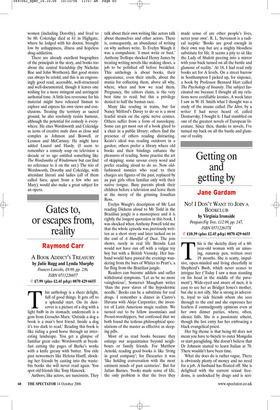Gates to, or escapes from, reality
Raymond Carr
A BOOK ADDICT’S TREASURY by Julie Rugg and Lynda Murphy Frances Lincoln, £9.99, pp. 236, ISBN 0711226857 ✆ £7.99 (plus £2.45 p&p) 0870 429 6655 This anthology is a sheer delight, full of good things. It gets off to a splendid start. On its dustcover is a picture of a dog with a light bulb in its stomach; underneath is a gem from Groucho Marx: ‘Outside a dog a book is a man’s best friend. Inside a dog it’s too dark to read.’ Reading this book is like riding a good horse through an interesting landscape. You get a glimpse of familiar great oaks: Wordsworth at breakfast cutting the pages of Burke’s works with a knife greasy with butter. You ride past newcomers like Helena Hanff, shocking her friends by casting into the wastebin books she will never read again. You spot old friends like Tony Hancock.
Authors, like actors, are narcissists. They talk about their own writing like actors talk about themselves and other actors. There is, consequently, an abundance of writing on why authors write. To Evelyn Waugh it was a compulsion: ‘I must write or bust.’ Anthony Trollope shocked Henry James by treating writing novels like making shoes, a job to be polished off before breakfast. This anthology is about books, their appearance, even their smells, about the mania for collecting them, above all why, where, when and how we read them. Pregnancy, the editors claim, is the very best time to read; but this a privilege denied to half the human race.
Many like reading in trains, but for Nancy Mitford’s Davey to do so is a most fearful strain on the optic nerve centres. Others suffer from a form of narcolepsy. Some can get most out of a book glued to a chair in a public library; others find the presence of others reading distracting. Keats’s ideal was reading outdoors in a garden; others prefer a library where old books and their bindings enhance the pleasures of reading. Some practise the art of skipping; some savour every word and prefer reading aloud to do so. Now oldfashioned nannies who read to their charges are figures of the past, replaced by au pair girls often familiar only with their native tongue. Busy parents plonk their children before a television and leave them at the mercy of the grinning Jonathan Ross.
Evelyn Waugh’s description of Mr Last reading Dickens aloud to Mr Todd in the Brazilian jungle is a masterpiece and it is rightly the longest quotation in this book. I was shocked when Anthony Powell told me that the whole episode was previously written as a short story and later tacked on to the end of A Handful of Dust. The join shows; surely in real life Brenda Last would not have run off with a vulgar toy boy but with a British Vronsky. Her husband would have passed the evenings wandering from the bars of Whites to Pratt’s, a far fling from the Brazilian jungle.
Readers can become addicts and suffer withdrawal symptoms. ‘Let us be no more vainglorious’, Somerset Maugham writes ‘than the poor slaves of the hypodermic needle.’ Books can be a substitute for real drugs. I remember a dinner in Castro’s Havana with Alejo Carpentier, the inventor of Latin American magic realism. We turned out to be fellow insomniacs and Proust-worshippers, but confessed that we both found the tedious philosophical speculations of the master as effective as sleeping pills.
Most of us read books because they enlarge our acquaintance beyond neighbours or family friends. For Matthew Arnold, reading good books is like ‘living in good company’; for Descartes it was ‘like holding conversation with the most eminent minds of past centuries’. But for Julian Barnes, ‘books made sense of life, the only problem is that the lives they made sense of are other people’s lives, never your own’. R. L. Stevenson is a radical sceptic: ‘Books are good enough in their own way but are a mighty bloodless substitute for life. It seems a pity to sit like the Lady of Shalott peering into a mirror with your back turned on all the bustle and glamour of reality.’ At 18, I had read only books set for A levels. On a street barrow in Southampton I picked up, for sixpence, a book by Professor Bernard Hart called The Psychology of Insanity. The subject fascinated me because I thought all my relations were certifiable loonies. A week later I saw in W. H. Smith what I thought was a study of the insane called The Idiot, by a writer I had never heard of, called Dostoevsky. I bought it. I had stumbled on one of the greatest novels of European literature. Since then, thanks to novels, I’ve turned my back on all the bustle and glamour of reality.


































































































 Previous page
Previous page